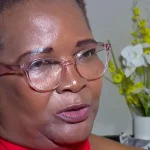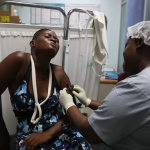Herders scooping murky water from a small pond in grasslands in South Sudan are well aware of the dangers they face if they drink it.
“The water is dirty because this place has oil – it has chemicals in it,” says their chief, Chilhok Puot.
Nyatabah, a woman from this community raising cows in the heart of oil fields in Unity State, adds: “If you drink it, it makes you pant and cough.
“We know it’s bad water, but we don’t have anywhere else, we’re dying of thirst.”
A former oil engineer, David Bojo Leju, has told the BBC World service that flooding in the area is washing pollution into water sources.
Large swathes of the state have been under water for several years after unprecedented flooding, which scientists say has been worsened by climate change.
Mr Bojo Leju says the floods are a “disaster” and that pollution from mismanaged oil facilities is a “silent killer” spreading across the state.
South Sudan is the world’s youngest country and one of its poorest, with a government hugely dependent on oil revenue.
Unity State, a major oil-producing state, has always experienced seasonal flooding. But in 2019, extreme rains brought a deluge that engulfed villages, grasslands and forests. Year after year of intense rainfall followed. The water built up, trapped on the clay soil.
At the worst point in 2022, two-thirds of Unity State were submerged, according to the UN World Food Programme (WFP) – even now, it says about 40% is still under water.

Mr Bojo Leju worked for eight years for the oil consortium Greater Pioneer Operating Company (GPOC), a joint venture between Malaysian, Indian and Chinese oil companies – with South Sudan’s government owning 5%.
After a major pipeline rupture five years ago, he started photographing and filming pools of oily water and heaps of blackened soil in locations in Unity State, including sites near Roriak, where the herders live.
He says spills from oil wells and pipelines were “a recurring situation”, and that he was involved in transporting contaminated soil away from roads, so it would not be seen.
He tried to raise his concerns with company managers, but he says little was done and “there was no treatment plan for soil”.
Mr Bojo Leju also says “produced water” – water released from the ground when oil is extracted and often containing hydrocarbons and other pollutants – was not properly treated.

There were reports of high oil content, above international standards, in the produced water “every day in our morning meeting”, he says, “and this water is injected back into the environment”.
“The question is where does water flow?” he says.
“Up to the river, up to the water source where people drink, up to ponds where people catch fish.”
Mr Bojo Leju explains that “some of the oil chemicals seeped down” into the groundwater, where they will flow into boreholes.
“The water table is contaminated,” he says.
When intense rains began in 2019, earth dykes were put around some spilled oil “but it was not enough to withstand the volume of water”, he adds.
In Roriak, there is no data available about the quality of the water the herders drink, but they fear pollution is making their cattle sick.
They say calves have been born without heads or without limbs.
Unity State’s agriculture minister blames the deaths of more than 100,000 cattle in the last two years on the floods combined with oil pollution.

In a forest close to Roriak, a group of men and women chop down trees to make charcoal.
They have walked for eight hours along dirt roads flanked by flood water to reach the forest.
They say the only water they can find here is polluted.
Even boiled “it causes diarrhoea and abdominal pain”, says one woman, Nyakal.
Another, Nyeda, wipes away tears, saying she needs the charcoal to sell, but is worried about her seven children, left with her mother for a week.
“She has nothing either,” she says.
Nyeda lives near the state capital, Bentiu, in a reed hut squeezed into a camp housing 140,000 people who have fled conflict or the floods. It is completely surrounded by flood water and protected only by earth dykes.
There is some food aid, but many in the area survive by foraging for water lily roots and fish to supplement their rations.
Safe water is scarce. Nyeda uses water from a borehole for washing and cooking, but needs money to buy drinking water.

Health professionals and politicians in the area have told the BBC they fear pollution and the lack of clean water are taking a toll on human health.
In a hospital in Bentiu, a mother has just given birth. Her new-born baby’s nose and mouth are joined.
“They have no access to clean water,” says Dr Samuel Puot, one of the doctors caring for the baby.
“They just drink from the river where water and oil are mixed. That might be the problem.”
He says there are “many” cases of children born with abnormalities, such as no limbs or a small head, in Bentiu and also Ruweng, an oil-producing area north of Unity State.
They often die within days or months, he adds.
Genetic testing can give clues about the causes of congenital abnormalities, but the hospital does not have the facilities, and results are often not conclusive.
Dr Puot wants the government to keep a register of cases.
As the data is not recorded systematically, it is not clear whether these anecdotal reports indicate an unusually high prevalence of congenital abnormalities.

“It is plausible that oil-related pollution could contribute to an increased risk of birth defects,” says Dr Nicole Deziel, an environmental health specialist at Yale University.
Environmental pollution is a risk factor for congenital abnormalities, alongside genetics, maternal age, infection and nutrition, she says.
Some compounds released during the production of oil can affect foetal development, Dr Deziel adds.
“Anecdotal reports can serve as important indicators of environmental health problems,” she says, but stresses that without systematic data collection, establishing evidence of a causal relationship is difficult.
In 2014 and 2017, the German-based non-governmental organisation Sign of Hope carried out peer-reviewed studies close to other oil fields in Unity State.
They found increased salinity and high concentrations of heavy metals in water nearer oil wells, as well as high concentrations of lead and barium in human hair samples.
The researchers concluded these were indicators of pollution from oil production.
The government has commissioned an environmental audit of the impact of the oil industry, but the results are yet to be made public more than a year later than expected.
Mary Ayen Majok, a senior politician from the ruling party, has been raising concerns about oil pollution for more than a decade.
She is a member of the government and deputy speaker in the upper house of the South Sudanese parliament, and is from Ruweng.
She says one of her own relatives has had a child “born with deformities” and believes many such cases are not reported because of fear of stigma or lack of access to medical facilities.
Ms Majok says South Sudan “inherited an industry that was based on bad practices” when the country was formed in 2011 after it gained independence from Sudan.
A five-year civil war broke out in 2013. For a nation facing conflict and heavily dependent on oil revenues, improving environmental responsibility has been “at the tail of our priorities”, she says.
Laws and institutions have been established but “accountability is not that strong”, she says.

“Talking about oil is like touching the heart of the government,” says Mr Bojo Leju.
He spoke to the BBC in Sweden, where he has been granted asylum.
In 2020 he was approached by South Sudanese lawyers who wanted to sue the government over oil pollution.
He agreed to testify as a witness. But he says security personnel detained him, hit him on the head with a pistol and forced him to sign a document recanting his evidence.
He fled the country soon afterwards. The lawyers did not pursue their case.
The BBC asked the oil consortium GPOC and the South Sudanese president’s office to comment on the allegations in this report, but they did not respond.

Scientists are not sure whether the floods in Unity State will ever recede.
Dr Chris Funk, director of the Climate Hazards Center at University of Carolina, Santa Barbara, says 2019 saw record sea surface temperatures in the west Indian Ocean, which “would have been impossible in a world without climate change”.
Warmer air can hold more moisture, and he says there was a “strong link” between these sea temperatures and the 2019 extreme rains over East Africa.
Dr Funk says higher rainfall has continued since then over the Lake Victoria basin that feeds into South Sudan, but it is not clear whether this is a permanent new pattern.
Temperatures in South Sudan have risen and are expected to rise further, he adds.
This means extreme precipitation “will be more extreme” and, under some global warming scenarios, heat and humidity could mean some parts of the country “would not be liveable”, he says.
However, despite the floods and pollution fears, many here hope to return to a life of raising animals and living off the land.
In Roriak, children fashion a miniature village out of the clay on the ground, complete with model huts and cows.
And near Bentiu, an elderly woman grinds water lily roots next to the flood water. She says she would like to a have a cow again, one day.
“When the water goes down, I’ll grow grain, even if it’s years,” she adds.















